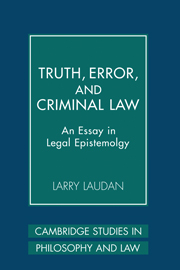Book contents
- Frontmatter
- Contents
- Preface
- Abbreviations and Acronyms Used
- 1 Thinking about Error in the Law
- PART I THE DISTRIBUTION OF ERROR
- PART II FLAWED RULES OF EVIDENCE AND PROCEDURE
- 5 Evaluating Evidence and Procedures
- 6 Silent Defendants, Silent Witnesses, and Lobotomized Jurors
- 7 Confessions, Poison Fruit, and Other Exclusions
- 8 Double Jeopardy and False Acquittals: Letting Felons and Judges off the Hook?
- 9 Dubious Motives for Flawed Rules: The Clash between Values
- Index
5 - Evaluating Evidence and Procedures
Published online by Cambridge University Press: 05 June 2012
- Frontmatter
- Contents
- Preface
- Abbreviations and Acronyms Used
- 1 Thinking about Error in the Law
- PART I THE DISTRIBUTION OF ERROR
- PART II FLAWED RULES OF EVIDENCE AND PROCEDURE
- 5 Evaluating Evidence and Procedures
- 6 Silent Defendants, Silent Witnesses, and Lobotomized Jurors
- 7 Confessions, Poison Fruit, and Other Exclusions
- 8 Double Jeopardy and False Acquittals: Letting Felons and Judges off the Hook?
- 9 Dubious Motives for Flawed Rules: The Clash between Values
- Index
Summary
The great body of the law of evidence consists of rules that operate to exclude relevant evidence.
– McCormick's handbook of the law of evidence[A] criminal trial is anything but a pure search for truth. When defense attorneys represent guilty clients – as most do, most of the time – their responsibility is to try, by all fair and ethical means, to prevent the truth about their client's guilt from emerging.
– Alan M. DershowitzNone of the concepts studied thus far – the standard of proof, the burden of proof, the BoD, or the PI – does anything to reduce erroneous verdicts in the aggregate. All are targeted at making it likely that, when errors do occur, they are more likely to be false acquittals than false convictions. We must now move away from issues of error distribution – what we might call soft-core legal epistemology – and toward its hard-core: error reduction. The following four chapters will examine a variety of specific rules, practices, and procedures that serve as major obstacles to the twin tasks of finding truth and avoiding error. In this chapter, our remit will be broader and more theoretical.
It is a long-standing tradition in law schools and law texts to draw a sharp boundary between the rules of evidence and the laws of criminal procedure. Indeed, evidence law and criminal procedures are generally taught in different classes and by different specialists. By contrast, my focus will be on both.
- Type
- Chapter
- Information
- Truth, Error, and Criminal LawAn Essay in Legal Epistemology, pp. 117 - 146Publisher: Cambridge University PressPrint publication year: 2006

